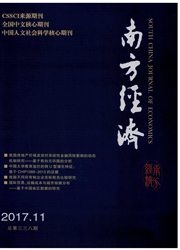

 中文摘要:
中文摘要:
本文利用全国综合社会调查数据(CGSS2003),首先使用Probit模型估计了个体上大学的概率,然后运用倾向指数匹配方法估计了2002年我国城镇居民的大学教育收益率。Probit估计结果表明家庭背景及地区对个人上大学的概率具有显著影响。匹配方法估计结果显示,大学毕业相对于高中毕业的教育收益率在79.1%以上,年均超过19.8%。传统的OLS方法估计的大学教育收益率仅为56.1%,低于匹配方法的估计结果。另外,高中组个体的潜在大学教育收益率可能高于大学组的大学教育收益率。
 英文摘要:
英文摘要:
Using data from CGSS 2003 survey, employing propensity score matching methods, we estimated the return to higher education in urban China. First, we use Probit model to estimate the propensity scores, which shows that the family background and region dummies have significant effects on the probability of entering universities. Our Matching method estimation shows that compare with high school education, the return to higher education is more than 79.1% % and over 19.8% every year, which is tremendously high. The estimates show that the higher the potential return to education, the more year of education they attained. If ignoring this education selection behavior, it' s inclined to underestimate the return to education for the higher-educated people, but inclined to overestimate the return to education for less-educated people.
 同期刊论文项目
同期刊论文项目
 同项目期刊论文
同项目期刊论文
 期刊信息
期刊信息
